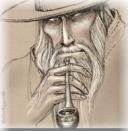
A tale started by J.R.R. Tolkien and completed by Christopher Tolkien. This book is darker than "The Lord of the Rings" and "The Hobbit". The story occurs about 6500 years before incidents in LoTR, when the Dark Lord Morgoth (aka Melkor) is at his peak. The brave Hurin (pronounced as Hoorin), a leader of men (Edain), joins the Elves (Eldar) in the war to overthrow Morgoth. Unfortunately, the alliance is brutally crushed by the dark forces and Hurin is captured. But even as a prisoner he refuses to acknowledge Morgoth's supremacy, thereby earning the Dark Lord's wrath, who curses Hurin's children - Turin and Nienor. The rest of the story mostly follows the tragic fate Turin and that of Nienor towards the end.
I liked the book a lot because, unlike in LoTR, a lot of the characters in the book, including the protagonist, are imperfect. This adds an element of reality to the proceedings. Better sense does not always prevail, which later leads to regret and grief. For instance, Turin briefly joins a bunch of outlaws who attack and rob men (besides orcs and elves) for a living. He slays his best friend Beleg. Mim the petty dwarf, despite taking a liking to Turin, betrays him to the forces of Angband. There are many more such instances, which bring out the sinister side of many characters.
Once again, Tolkien's fascination with dragons comes to the fore in this novel. Glaurung is one of Tolkien's most interesting villains, arguably even better than Smaug (from The Hobbit). Sample this line for instance, when Glaurung enchants Turin with his hypnotic gaze to prevent him from rescuing Finduilas, manipulating him to go in search of his mother instead.
'Nay! At least you are valiant. Beyond all whom I have met. And they lie who say that we of our part do not honour the valour of foes. See now! I offer you freedom.'
The book was so gloomy that I was left hoping for a tragic ending, as anything otherwise would've been total misfit. Even in LoTR, the part I liked the most was "The scouring of the Shire", where Frodo and team, inspite of having saved the Middle Earth, still have to fight a small battle to reclaim the Shire. Tolkien doesn't disappoint.
All in all, it was a story about a classic anti-hero, who, after making one disastrous decision too many, redeems himself at the end with tragic consequences. Finally, the message that children are sometimes forced to carry the burden of the curse laid on their parents, isn't lost on the reader.


